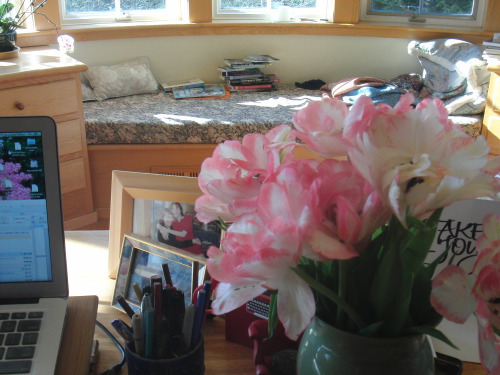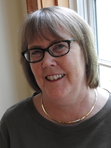Finding Ways into Poems
During the past few months, age, grief, a heart condition, and who knows what else has brought more changes to my mother-in-law than in all the thirty years I’ve known her. She’s always been proud to be punctual and dependable, working at a library for many years without taking a single sick day, keeping regular habits, though those have switched in the past decade, so we’ve sometimes stopped in mid-afternoon and interrupted supper: “We thought we’d get that over with.” She’s famous for sticking to her opinion, which have recently been mostly about disappointments. Even food she used to like no longer tastes good. It’s a slippery world for all of us, as we navigate through conversations marked with denial and delusion, weighed down by depression. What’s true here? What can be of use?
My desk isn’t that dark – I’ve got tulips! – but these are the same questions I pose when writing a poem. A few weeks ago after visiting Alice in a hospital, I wrote in my journal as a way to order my mind back to what I’m more accustomed to, less ringing with desires that can’t be met. Hearing repetitions of small points of humor and compassion in my visit, and the way both Alice and I felt lost, I used those meeting places to structure Finding a Way.
That poem came together for me fairly quickly. More often I need to paste thick layers of words and phrases before I find a path from beginning to end. Listening for rhythms, the ends of breaths and echoes between words, I ask my more conscious self, who I’ve trained to be neither overly critical nor overly lazy, to note what may be of value, while paring away what’s not. Poet George Oppen wrote: “It is necessary to study the words you have written for the words have a longer history than you have and say more than you know.” We write and listen, as if following a conversation. If we keep at it long enough, and are honest about what we don’t know — perhaps because we’re writing fast enough to escape shame, or slowly enough to catch sight of something shy – we may catch something that’s deeper than our ordinary knowing. Maybe we can call it true.






